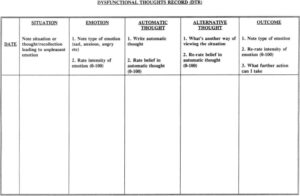What Are Thought Records in CBT?
If you’re familiar with cognitive behavioural therapy (CBT), you will know that thought records are a key component of the approach. Thought record templates are a practical way for clients to capture unhelpful thoughts, feelings and evidence in an easily accessible format. By completing these worksheets, clients learn to identify how their thoughts and behaviour are interlinked, and can begin to change the unhelpful beliefs that are causing them distress.
This simple thought record template is a useful tool for anyone who wants to monitor negative automatic thoughts and their impact on their mood. It asks for clients to rate their moods after each step and provides space for them to write down their thoughts. It also encourages them to consider alternative perspectives which can help them to challenge their negative automatic thoughts and replace them with more helpful ones.

For this reason, thought records are a valuable tool to use between sessions with a cognitive behavioural therapy. Clients can download this template, print it out and fill it in with their responses to each of the prompts. Then they can refer back to it when they start to experience difficulty identifying their automatic negative thoughts and find it difficult to think positively.
As with all our CBT worksheets, we’ve made this one as simple as possible to make it easy for clients to complete. We recommend that clients try to fill it out regularly, so that they can build up a habit of examining their thoughts and finding evidence that supports or challenges them.
Thought Records in CBT
Often, when people are struggling with negative emotions and thoughts, they become very self-critical. They are hard on themselves for having certain thoughts or regretting a past action and can often feel shame and guilt about the experience. For this reason, it is especially important for abuse survivors to be able to learn to view their experiences from an external perspective. This thought record allows them to explore how abusers operate in order to obtain compliance from victims, and to recognise that their self-criticism is not helpful or accurate.
A final benefit of this worksheet is that it helps clients to develop and practise their metacognition skills. The ability to recognise and understand that their irrational thoughts are causing them distress is crucial, as it means they can challenge them in the moment, when they are feeling most vulnerable.
This worksheet can be used for a range of situations, but it is particularly relevant for those who have experienced physical, emotional and sexual abuse. For this reason, we’ve also included a version that can be used to explore how these thoughts might play out in abusive relationships. It is designed to be used by clients who are working with a CBT therapist to understand how they can challenge their negative, dysfunctional thinking patterns and break free from the power of the abusive relationship. It’s a great tool to use for both group and individual therapy, as it can be easily modified to meet the needs of different groups.